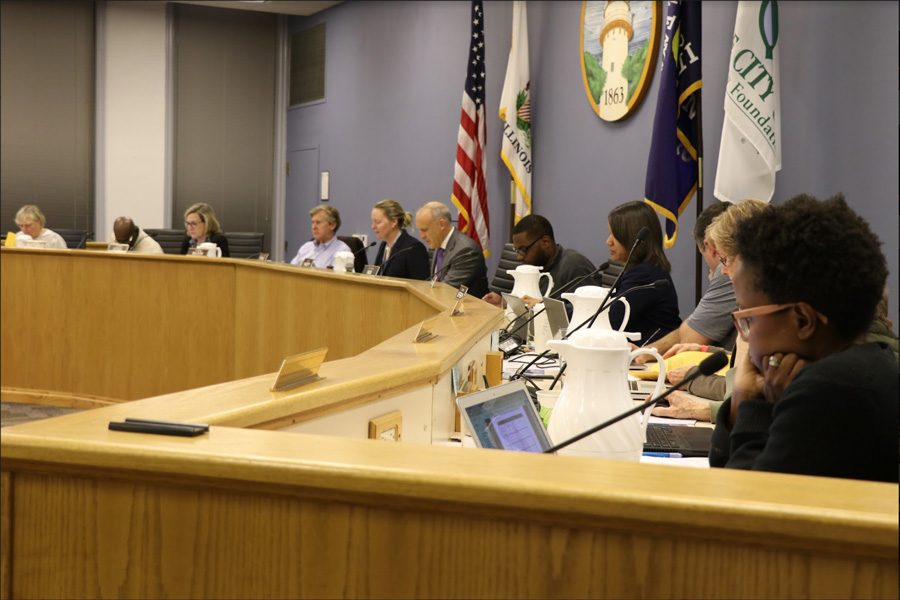Evanston activists hope to introduce medical aid in dying resolution
Daily file photo by Christopher Vazquez
City Council. Some Evanston activists hope to introduce a resolution to City Council that would pressure the Illinois government to take action on the medical aid in dying issue.
November 7, 2019
Some Evanston activists hope to introduce a resolution to City Council in early 2020 that would urge the Illinois government to pass legislation to allow medical aid in dying.
The proposed resolution opens the possibility for doctors to prescribe lethal medication to terminally ill adults who choose to end their lives, sometimes known as medical aid in dying. In this particular case, Amy Sherman, the regional campaign manager for Compassion and Choices — a nonprofit organization that advocates for end-of-life options, including medical aid in dying — stressed that the process, which is one option of many, is meant for terminally ill adults with a prognosis of six months or fewer to live.
She added that the patient has to be mentally capable of making this decision — for example, a dementia patient would not be eligible for the process — and doctors merely prescribe the medicine while the patients self-ingest it. She said that based on the organization’s experience, many people who consider this option have traditionally painful terminal illnesses, such as cancer and ALS.
“The option is to request a doctor’s prescription for medication that they can decide to take,” she said. “Again, it’s an option, it’s voluntary — that they decide to take in their final days or weeks could end intolerable suffering.”
Eight states and Washington, D.C. already allow this practice. Fay Clayton, a member of Evanston’s action team for Compassion and Choices and one of the activists responsible for the proposed resolution, hopes Evanston can play a role in getting such a law passed in Illinois.
Clayton hoped to get the resolution introduced at the end of October or the beginning of November, before City Council got busy with the budget or holiday breaks, but due to a rule change, the team was unable to submit the resolution in time.
“We decided we would wait until the beginning of the year,” Clayton said. “The system’s too jammed-up now.”
Ald. Melissa Wynne (3rd) has agreed to introduce the legislation, according to Clayton. Wynne did not immediately respond to The Daily’s request for comment.
At the statewide level, state Sen. Rep. Robyn Gabel (D-Evanston) and state Sen. Laura Fine (D-Glenview) both support medical aid in dying legislation. Fine said Gabel would push a bill through the Illinois House, while she would push the bill through the Senate.
Fine stressed the importance of getting legislation passed quickly, but not before Illinois residents and officials have been properly educated on the subject.
“The sooner we’re able to get it done, the better for people who would benefit from it because you don’t want somebody living in a life of pain if they don’t have to live in that life of pain,” Fine said. “But on the same note, if we take our time with it and make sure we get it right and make sure we answer all of these questions, and have a better opportunity of passing it and getting it signed into law, the better off we’ll be.”
Currently, Clayton and her team are also working to educate Evanston residents about the issue. They have held talks at ward meetings, The Mather and different religious organizations. They sometimes play an educational movie with the discussion.
Across the country, support for medical aid in dying has grown. A 2018 Gallup poll found 72 percent of Americans support legal euthanasia, but that the process of euthanasia involves someone other than the terminally ill patient administering the lethal medication, which is illegal in the U.S.
As for doctor-assisted suicide, which is a term Gallup uses for patients who self-administer the lethal dose, only 52 percent of Americans in 2019 said they support the practice. Gallup said this might be because “suicide” sounds harsher than the description for euthanasia.
Sherman wanted to stress that medical aid in dying, however, is not suicide.
“(Medical aid in dying) is for people who would love to live but are dying, and are suffering,” she said. “It is done with a very considered process.”
Many laws also build in multiple steps before patients can go through with terminating their lives. For example, in Oregon, the law stipulates a waiting period between two oral prescription requests, which must be at least 15 days, in addition to other requirements.
Email: [email protected]
Twitter: @emmaeedmund


